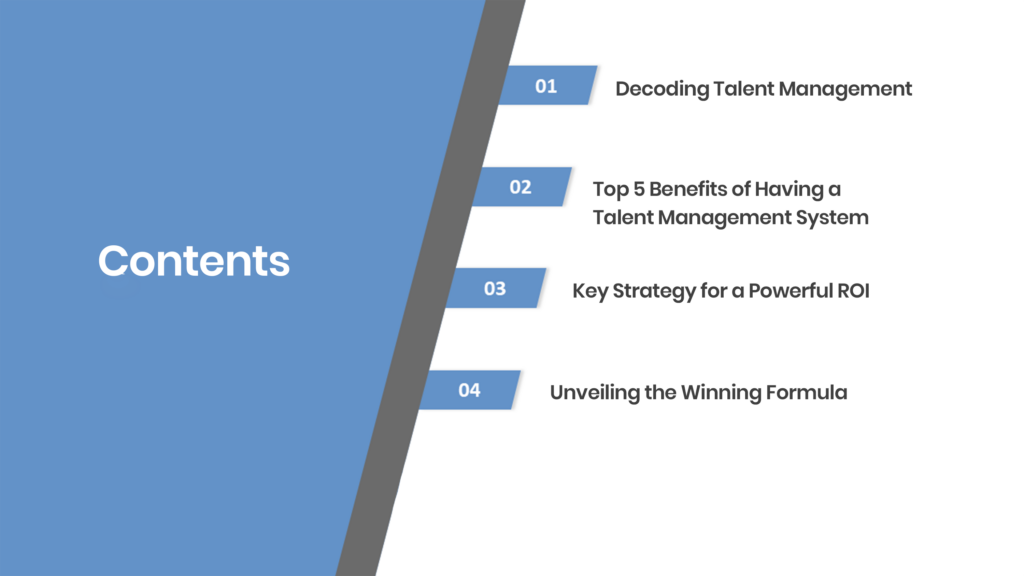Master the art of talent by attracting, developing, and retaining top-performing individuals within an organization. In today’s competitive business landscape, implementing a robust talent management strategy has become more essential than ever before.

DECODING TALENT MANAGEMENT
Why do we need a talent management system?
The answer lies in the undeniable value that exceptional talent brings to an organization. A talent management system encompasses a comprehensive set of practices and processes designed to optimize the full potential of employees throughout their journey within the organization.
A strong talent management strategy enables businesses to identify and attract high-potential individuals who possess the skills, knowledge, and attributes that align with the organization’s goals and culture. It ensures that these talented individuals are nurtured and empowered to reach their full potential, contributing significantly to the organization’s success.
In the upcoming sections of this blog, we will explore the benefits of having a talent management strategy and unveiling the key strategy for a powerful ROI. By developing a strong talent management strategy, you can harness the power of your employees, transform culture, and achieve sustainable success in the ever-evolving business world.
TOP 5 BENEFITS OF HAVING A TALENT MANAGEMENT SYSTEM
A well-designed talent management system brings in numerous benefits to an organization.
Let’s delve into the top advantages of implementing a robust talent management strategy:
1. The Hiring Edge
With a robust talent management system, HR teams can streamline the hiring process, from creating compelling job descriptions to conducting targeted candidate assessments. This strategic approach to hiring ensures that organizations bring in individuals who align with the company’s long-term goals and contribute to its overall success.
2. Improves the Onboarding Process
Effective onboarding sets the stage for a positive employee experience and long-term success within an organization. A talent management system facilitates a seamless onboarding process by automating administrative tasks, providing access to relevant resources, and enabling new hires to quickly integrate into the company culture.
3. Embrace Diversity, Equity, and Inclusion
70% of companies rated themselves as world class in relation to gender & diversity as a priority. A talent management system allows organizations to embed DEI principles throughout the employee lifecycle. From diverse candidate sourcing to implementing unbiased selection processes, a talent management system promotes equal opportunities and fosters an inclusive workplace culture.
4. Elevating Employee Journey
A talent management system enables organizations to optimize the employee journey at every touchpoint. By providing ongoing feedback, coaching, and recognition, organizations can foster a culture of continuous learning and growth, employees feel supported in their professional advancement, leading to increased job satisfaction, performance, and loyalty.
5. Talent Retention Unleashed
Through talent assessments, organizations can identify high-potential employees and create tailored development plans to nurture their skills and aspirations. By offering opportunities for internal mobility and advancement, organizations can retain their best employees and reduce the costs associated with turnover.
KEY STRATEGY FOR A POWERFUL ROI
Developing a strong talent management strategy is not only essential for attracting and retaining top talent, but it also contributes to a powerful return on investment (ROI) for organizations.
By focusing on key strategic elements, organizations can maximize the effectiveness of their talent management efforts and reap significant rewards.
Let’s explore a key strategy for achieving a powerful ROI through talent management:
1. Policy Powerhouse
One of the key strategies for a strong talent management strategy is to develop comprehensive policies that outline the organization’s approach to talent management. Comprehensive policies encompass recruitment, performance management, training and development, succession planning, and employee engagement. Well-defined policies provide a framework for consistency and fairness, ensuring that talent management practices align with the organization’s goals and values.
2. Cultural Alignment
Integrating talent management practices, such as recruitment, performance evaluations, and recognition programs, with the values and beliefs of the organization. By fostering cultural alignment, organizations create an environment where employees feel a strong sense of belonging, leading to higher engagement, and overall performance.
3. Talent in Focus
Assess and evaluate the current talent within the organization which involves conducting thorough talent assessments, identifying high-potential individuals, and understanding the skills, competencies, and development needs of each employee. By gaining insights into the strengths and weaknesses of the workforce, organizations can tailor development plans, succession strategies, and training programs to effectively leverage their talent pool.
4. Promote Internal Mobility
Encouraging employees to explore growth opportunities not only nurtures their development but also improves retention rates. By creating clear pathways for advancement, offering job rotations, and providing opportunities for skill expansion, organizations can retain top talent, boost employee engagement, and reduce the costs associated with hiring.
5. Focus on the Employees’ Well-Being
Prioritizing well-being of employees involves creating a supportive work environment that emphasizes work-life balance, mental and physical health, and overall employee well-being contributes to higher job satisfaction, increased performance, and improved employee retention.
6. Foster a High-Performance Culture
A strong talent management strategy involves setting clear performance expectations, providing regular feedback and coaching, and recognizing and rewarding top performers. By fostering a culture that values excellence, organizations can motivate employees to strive for continuous improvement, leading to higher levels of creativity and innovation.
7. Metrics that Matter
To ensure the effectiveness of talent management initiatives, organizations must establish meaningful metrics and regularly monitor and evaluate their talent management efforts. By tracking and analyzing the metrics, organizations can identify areas for improvement, make data-driven decisions, and continuously refine their talent management strategies.
UNVEILING THE WINNING FORMULA
Talent is the lifeblood of an organization, and investing in its management is an investment in the future. By prioritizing the development and retention of top talent, you can unlock the full potential of your workforce and gain a significant advantage.
The secret lies in the holistic approach. A winning talent management strategy encompasses working harmoniously together to create a seamless and effective system. Embrace the winning formula, and unlock the potential of your workforce to reach new heights of success.
How can you work with Rytfit.ai?
At Rytfit.ai, we specialize in developing and empowering your employees through upskilling initiatives. By investing in your internal talent, we illuminate career development opportunities that enhance the employee experience and lead to improved employee retention.
Empower, Engage, Excel, and Unleash Your Workforce’s Potential.

